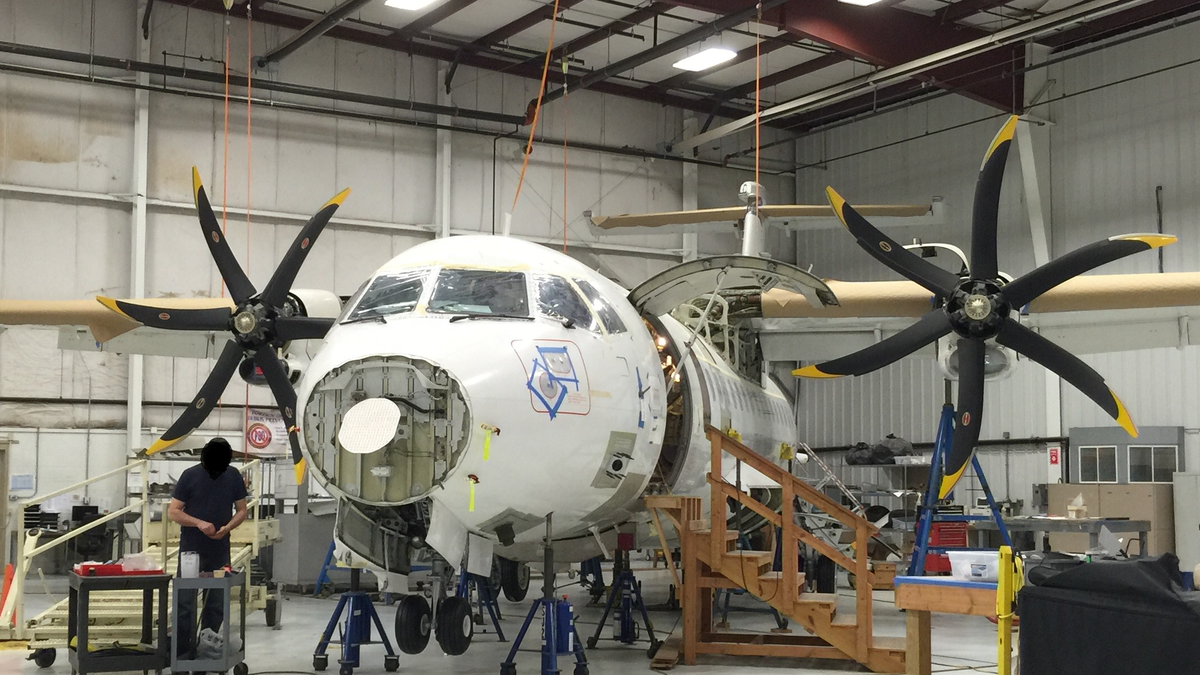
Shown here is the ATR 42-500 aircraft. (OIG)
The federal government dropped $86 million on an advanced Drug Enforcement Administration plane that was meant for counter-narcotics missions in Afghanistan – yet remains “inoperable” and “resting on jacks” to this day, according to a scathing watchdog report released Wednesday.
The review by the Justice Department's inspector general said the plane was purchased seven years ago to support anti-drug efforts in the Afghanistan war zone, where opium poppy cultivation has long been rampant. The so-called Global Discovery program to modify the ATR 42-500 aircraft with advanced surveillance capabilities was supposed to be completed in December 2012.
But the program has been plagued by missteps, has missed a string of deadlines, has ballooned in cost from an original estimate of $22 million, and remains incomplete and grounded in Delaware.
The report said it was unlikely the plane will ever fly in Afghanistan because the DEA has since ceased aviation operations there.
"Our findings raise serious questions as to whether the DEA was able to meet the operational needs for which its presence was requested in Afghanistan," the review said.
The project was part of an agreement with the Defense Department.
The DEA said in a statement that it agreed it "can and should provide better oversight of its operational funding" and was reviewing its policies and procedures.
The drug agency spent $8.5 million on parts for the plane — including $5 million in spare engines — "the majority of which cannot be used utilized on any other aircraft in its fleet," and the Defense Department built a $2 million hangar in Afghanistan for the plane that was never used and likely never will be, the report said.
The audit also found that the DEA didn't fully comply with federal procedures when it purchased the aircraft, spending nearly $3 million more than it had previously estimated for the $8.6 million aircraft.
The DEA also charged about $2.5 million in improper expenditures billed under the agreement with the Defense Department, including for costs associated with aircrafts and personnel who were entirely unrelated to the agency's Afghanistan operations. That included $8,122 in unallowable travel related to missions in Haiti, the Bahamas, Peru and Florida.
The review found the DEA's Aviation Division lacked adequate policies and procedures for receiving, reviewing and paying contractors with no requirement that any documentation be approved before personnel were paid. When modifications were improperly done on the plane, the Defense Department poured more money into the effort.
The plane, which has missed every scheduled delivery date, is now estimated to be completed in June — nearly one year after the DEA pulled out of Afghanistan. The report said the DEA intends to fly the plane in the Caribbean, Central America and South America.
The report made 13 recommendations to improve oversight of its aviation operations agreements and the problematic program.
The drug agency has already acted on two recommendations, according to the inspector general's office. That includes ensuring foreign offices are now required to provide supporting documentation to be paid for work. The agency said it's also now established an electronic method for pilots to submit mission reports to make sure program data is accurate.
In its formal reply to the audit, the DEA said that based on previous positive experiences using Defense Department contractors to modify its aircraft it "had no indication that the Global Discovery modification would encounter the significant delays and problems that ultimately occurred."
The Associated Press contributed to this report.




